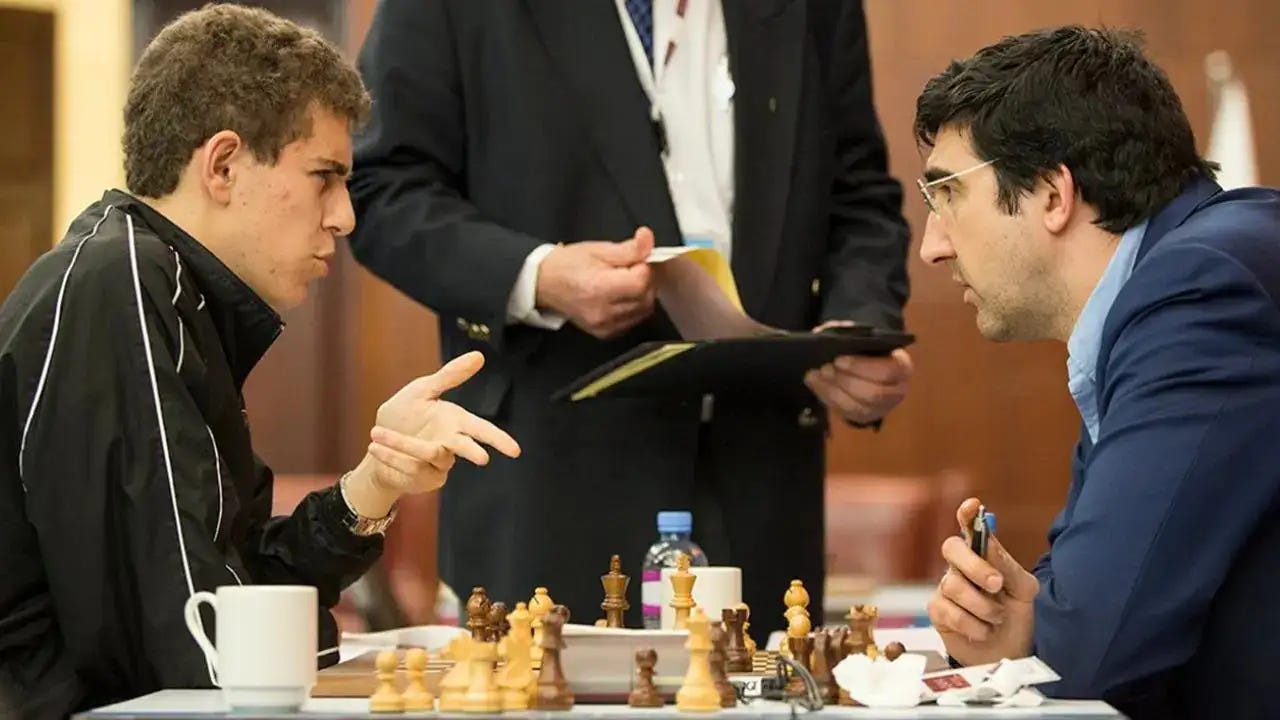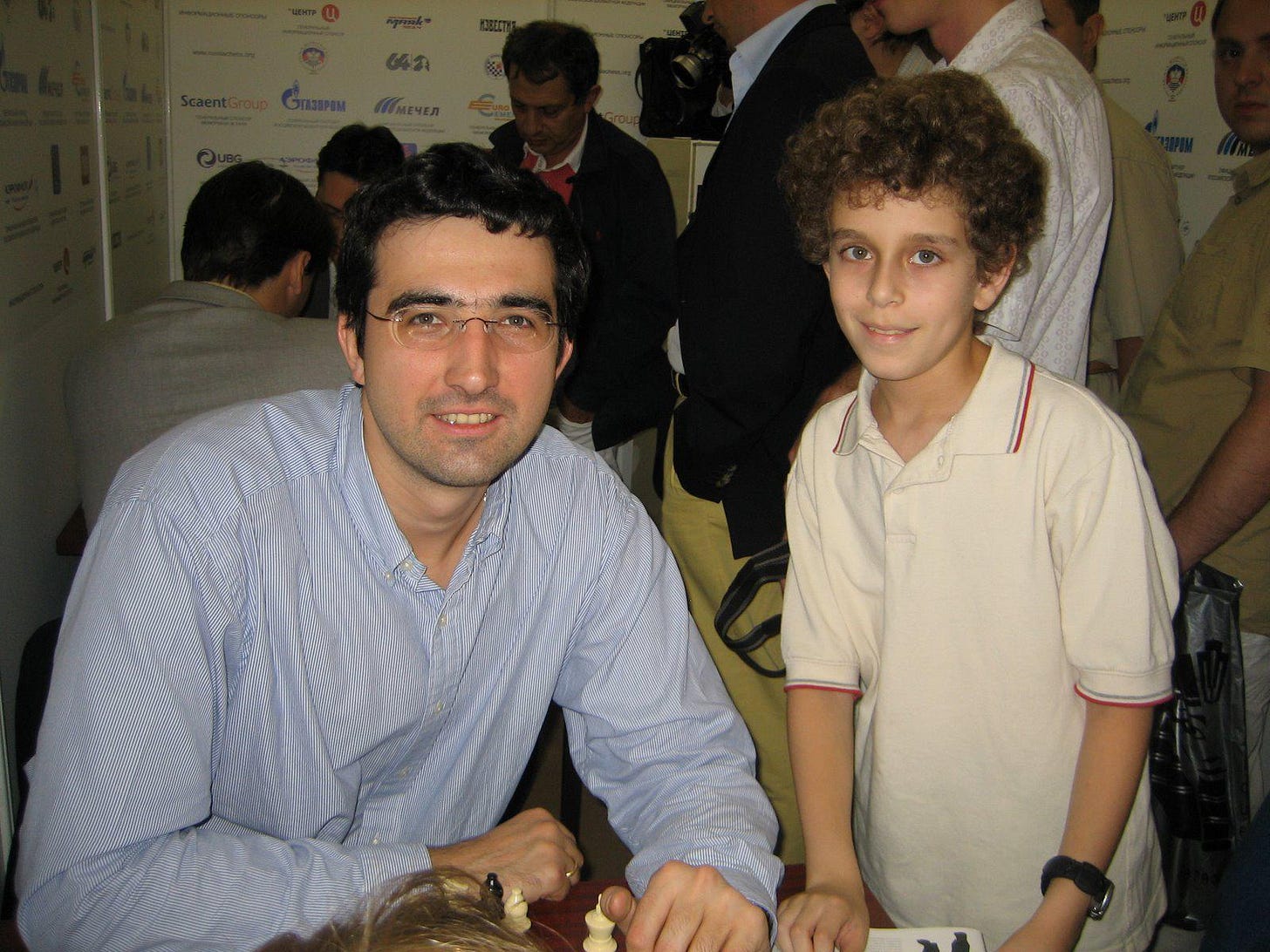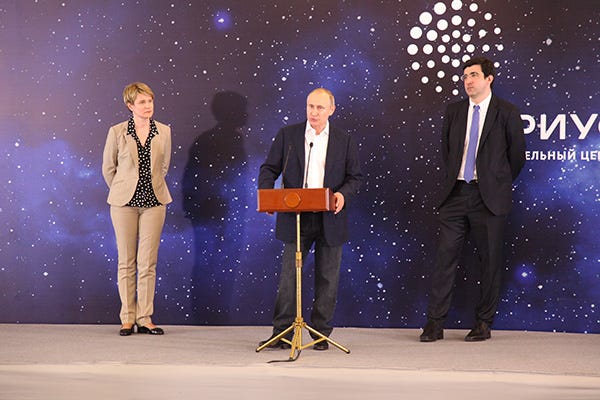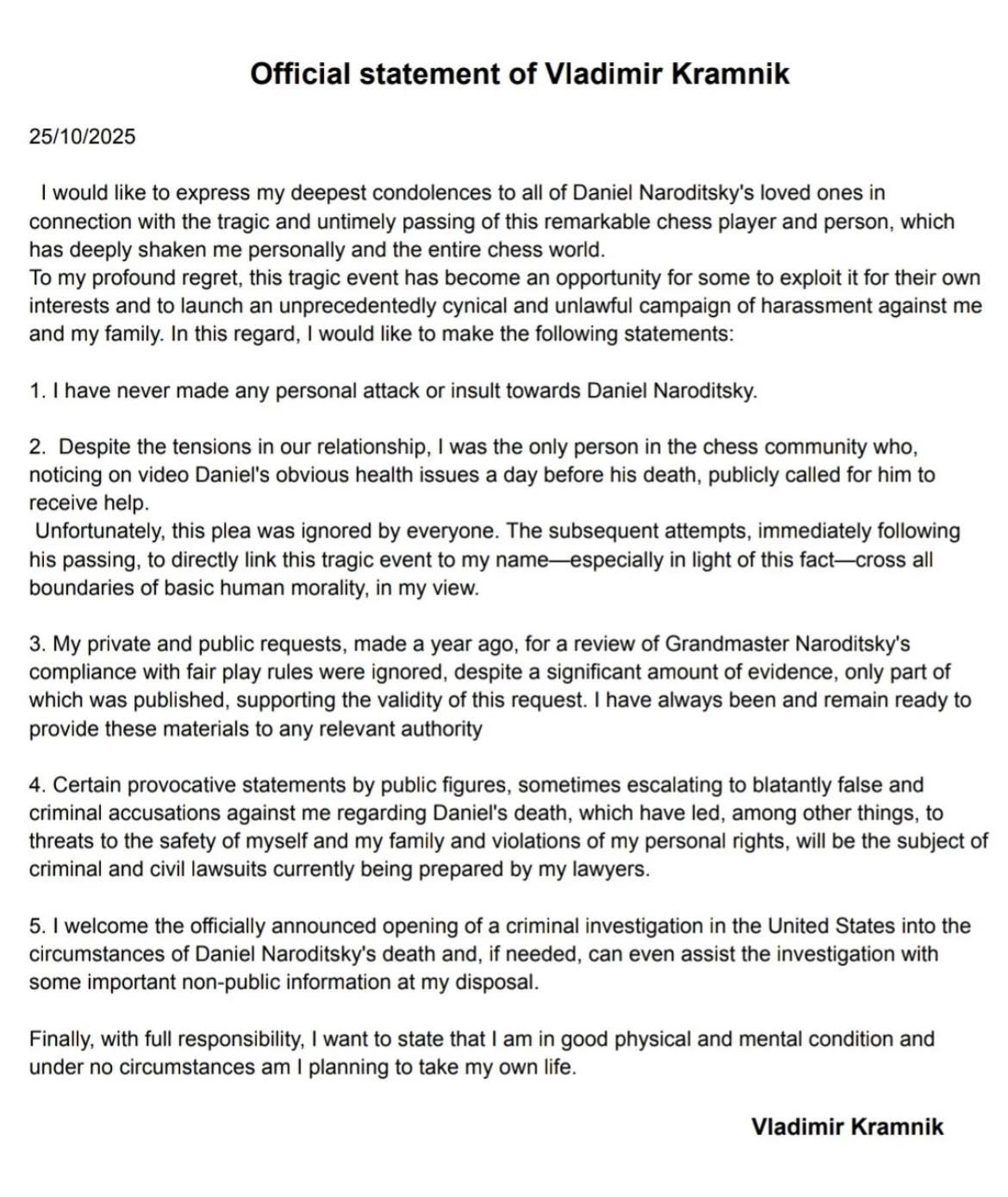One Final Game
Chess, politics, and the Russian grandmaster who went too far.
Welcome to Sports Politika, a media venture founded by investigative journalist and researcher Karim Zidan that strives to help you understand how sports and politics shape the world around us. My mission is to offer an independent platform for accessible journalism that raises awareness and empowers understanding.
If you share this vision, please consider supporting my work by joining becoming a paid subscriber. I am currently running a special offer whereby you can secure a subscription at a 40% discounted price…forever.
There was a moment during Daniel Naroditsky’s final Twitch stream on October 17 when concern turned to alarm. Off-camera, a friend begged him to stop playing and go to bed. Naroditsky, visibly sleep-deprived but insistent, pleaded for one last streak. When his friend threatened to cut the internet connection, the 29-year-old American grandmaster buried his face in his hands, exhaling in frustration.
“Please, just let me play a few more and then I’ll end the stream,” he said.
He didn’t. For hours, Naroditsky continued his marathon broadcast, determined to prove himself against the “lies” spread by Russian former world champion Vladimir Kramnik—false cheating accusations that had haunted him for a year. At one point, his tone darkened. Responding to a viewer who said this wouldn’t be the last time he faced criticism, Naroditsky gave a chilling reply: “Oh, it actually will be.”
Two days later, his friends—the same ones who had urged him to stop—found him dead in his Charlotte, North Carolina home.
Naroditsky, 29, was a talented grandmaster and a gifted chess streamer, educator, and commentator with more than 800,000 followers on his Twitch and YouTube channels. As one of the most influential and beloved American ambassadors for the sport, Naroditsky’s death sparked an unprecedented wave of tributes. There are more than a thousand comments on the chess.com memorial article honouring his legacy, while dozens of the world’s top players have shared their condolences and heartfelt sadness about his passing.
His passing was also covered widely by global media, including The New York Times, The Washington Post, and The Guardian, especially given the widespread discussion about whether Kramnik’s relentless (and baseless) anti-cheating crusade against Naroditsky contributed to his untimely death. Notable players like GM Nihal Sarin and FM Nemo Zhou have publicly urged the International Chess Federation (FIDE) to take disciplinary action against Kramnik for what they described as “relentless, baseless accusations.”
“When respected figures spread unfounded allegations without accountability, real lives are destroyed,” Sarin, who was one of Naroditsky’s last opponents, said on social media.
Over the past year, Kramnik—a grandmaster and world chess champion who reigned between 2000 and 2007—had repeatedly accused Naroditsky of cheating in online chess despite providing no evidence for his accusations. He maintained a persistent bullying campaign that took a toll on Naroditsky’s professional and personal life. The fact that Kramnik had once been his personal role model in chess, only made the bitter pill of the accusations more difficult to swallow. During an appearance on a podcast hosted by American grandmaster Fabiano Caruana last year, Naroditsky called Kramnik’s campaign “a sustained, evil” and that the Russian grandmaster was “trying to inflict emotional harm, physical harm on me. He knows exactly what he’s doing.”
In his final stream on Oct. 17, Naroditsky reiterated how trapped he feels by Kramnik’s accusations, telling viewers that “I feel like if I start doing well, people assume the worst of intentions.”
Kramnik, who retired from professional competition in 2019, has denied any wrongdoing, adding that he is in contact with the local police and has provided them with “additional info” in the hope that the “real truth about the circumstances and cause of this tragedy will be revealed, despite all attempts to hide it.”
Despite Kramnik’s vehement denial, his constant harassment of Naroditsky is widely believed to have contributed to the American’s tragic passing. A petition demanding sanctions against the Russian Grandmaster has since gathered over 16,000 signatures in three days. FIDE President, Arkady Dvorkovich, meanwhile, announced Wednesday that the regulatory body’s ethics and discipline commission would investigate Kramnik’s behaviour.
“In recent times, public debate within the chess world has too often moved beyond the boundaries of acceptable, harming not only people’s reputation but their very well-being,” Dvorkovich said in a statement issued by FIDE. “When this happens, discussions can turn into harassment, bullying, and personal attacks — a particularly serious concern in today’s environment.”
Kramnik has since hit back at FIDE, claiming in an interview with Russian media that the investigation against him was “unfair” and “ a shameful campaign of harassment against me and my loved ones.”
Although Naroditsky was the most prominent target of Kramnik’s campaigns, he was far from alone. David Navara, the Czech Republic’s top player was also accused of cheating by Kramnik. Navara, who has autism, later wrote that the incident drove him to a point of despair and even contemplated suicide. He filed a formal complaint with FIDE, yet the ethics and disciplinary committee took no action. Will the ethics committee fail to take satisfactory action against Kramnik as well?
FIDE’s CEO Emil Sutovsky added to the controversy when he took to social media to accuse Naroditsky’s friends and allies of “virtue signalling and like-grabbing” while openly wondering why those same people did little to help him through his struggles. “Did many of you write him to ask, whether he is OK? Why he, arguably the best online commentator disappeared from the screens? Did you text him to ask why did he stop streaming?” Sutovsky wrote.
Meanwhile, FIDE”s leadership has long been dominated by Russians with close governmental ties. The organization’s current president, Dvorkovich, served as deputy prime minister of Russia between 2012–2018, as well as a senior aide to then-President Dmitry Medvedev. Dvorkovich initially condemned Russia’s invasion of Ukraine in March 2022. He later quit his position as chairman of the prestigious Skolkovo foundation after Russian lawmakers criticized his comments as a “national betrayal.” Shortly thereafter, Dvorkovich posted a statement on the Skolkovo website that he was “sincerely proud of the courage of our (Russian) soldiers.”
Prior to that, FIDE was helmed by Kirsan Ilyumzhinov, the eccentric former president of the Russian republic of Kalmykia. Ilyumzhinov was a close ally of Putin who ruled the predominantly buddhist republic with an iron fist while fostering a cult of personality rooted in his love for chess. He played occasional chess with Libya’s former despot Muammar Qaddafi and once claimed to have been abducted from his Moscow apartment by aliens. He was added to a list of U.S. sanctions in November 2015 for allegedly “assisting or acting on behalf of” the Syrian government and was eventually suspended from his position at FIDE for violating the organization’s code of ethics.
Chess has long played a role in Russian politics. The Soviet Union weaponized chess as an instrument for propaganda during the Cold War years. Their dominance over the chess board allowed them to espouse the greatness of Soviet culture and the superiority of their political system. The Soviets remained a dominant force for more than three decades until a young American prodigy named Bobby Fischer usurped the throne from Soviet grandmaster Boris Spassky in 1972.
While the Soviet Union has long since collapsed, Russia remains influential within the chess world. Two of the six world champions since the fall of the Berlin wall have been Russians, including Kramnik, who defeated his countryman Garry Kasparov in 2000 to claim the crown. When Kramnik dethroned Kasparov—who by then was openly anti-Kremlin—it was widely framed in Russian media as “the return of order” in chess after Kasparov’s rebellion from the FIDE system.
As champion, Kramnik was viewed as a model of Russian rationality and cultural depth, reinforcing positive stereotypes of Russian intellect. His apolitical demeanour also helped normalize Russia’s image in international chess after years of Cold War tension. Unlike his fellow Russian grandmaster and former world champion Anatoly Karpov, Kramnik never held political office and was not a typical state propagandist. His contribution to Russian soft power was cultural rather than political, projecting an image of Russian excellence through personal success on the world stage.
The former world champion did have several public interactions with Putin. In 2016, the two men opened a new chess section at the Sirius Educational Centre in Sochi. Kramnik oversaw the project, which trained gifted young chess players from across Russia to improve their skills. In 2018, Putin visited the Russian chess Olympiad teams, where he stressed the importance of Russian regaining its dominance in chess. Kramnik was a member of the men’s team and could be seen beaming as Putin shook his hand in the video.
Nevertheless, Kramnik maintained an aura of respectability among global chess fans until he reinvented himself as the anti-cheating chess czar. In November 2023, Kramnik suggested that American grandmaster and popular Twitch streamer Hikaru Nakamura’s win record was “suspicious”—a baseless claim that was supported by other Russian grandmasters like Ian Nepomniachtchi. Nakamura, who has more than two million followers across YouTube and Twitch, hit back at Kramnik during one of his streams, saying “you don’t get to make false accusations when you are not an expert. You don’t get to make false accusations when you don’t have data to back yourself up.”
Kramnik’s conduct prompted Chess.com to close his blog and mute his account. He was later banned from prize tournaments on Chess.com after he was caught playing on fellow Russian grandmaster Denis Khismatullin’s account. Undeterred, Kramnik intensified his campaign the following year when he published a list of players on social media under the title “Cheating Tuesdays“ (a play on the popular chess.com event Titled Tuesdays). No credible evidence was provided.
Grandmaster Navara was among those who were accused by Kramnik in the aforementioned social media post, and later wrote about the affair in a blog for chess.com. He admitted that Kramnik’s unfounded behaviour “induced my suicidal thoughts and caused me a lot of pain.” He also blamed FIDE for not taking appropriate action and for ignoring the severity of his complaints. He specifically blamed Dvorkovich for FIDE’s inaction and called on him to resign.
Given FIDE’s limited response in the case of Navara, an autistic grandmaster who said he felt suicidal as a result of Kramnik’s sustained bullying campaign, there is reason to fear that the organization’s handling of the current investigation into Kramnik’s conduct may likewise prove inadequate. FIDE remains deeply entangled with Russian political interests—a lingering “KGB foreign hand” as Kasparov put it last year—and may be reluctant to sanction one of Russia’s most accomplished grandmasters. These concerns were heightened when FIDE’s own CEO appeared to deflect responsibility for Daniel Naroditsky’s death, suggesting that blame lay with the streamer’s friends rather than with the culture of harassment surrounding the controversy.
Nevertheless, the political dimension is irrelevant to Naroditsky’s mother, who recently spoke to the media about her son’s passing.
“‘There was nothing more important to Daniel than his dignity and his name as a chess player,” she was quoted as saying by Daily Mail. “And the ex-world champion was trying to say he’s a cheater. Daniel tried to defend himself so much. The whole world was on Daniel’s side. He played more and did more and more because he was trying to prove that he’s not what he was accused of.”
This remained true until Naroditsky’s final Twitch stream. During it’s final moments, Naroditsky appeared to grow drowsy before ending with a farewell that stuck with many of his fans: “Be well. Be healthy. Be safe.”
Update: Kramnik has released an official statement, where he denies accusing Naroditsky of cheating, absolves himself of any responsibility in his death, and signs off by claiming that “under no circumstances am I planning on taking my own life.”
The entire statement can be viewed below:
Sports Politika is a media platform focusing on intersection of sports, power and politics. Support independent journalism by upgrading to a paid subscription ( or gift a subscription if you already have your own). We would appreciate if you could also like the post and let us know what you think in the comment section below.







I was so shocked and saddened when Danya passed away. I mostly learned to play online, and he was one of my primary teachers.